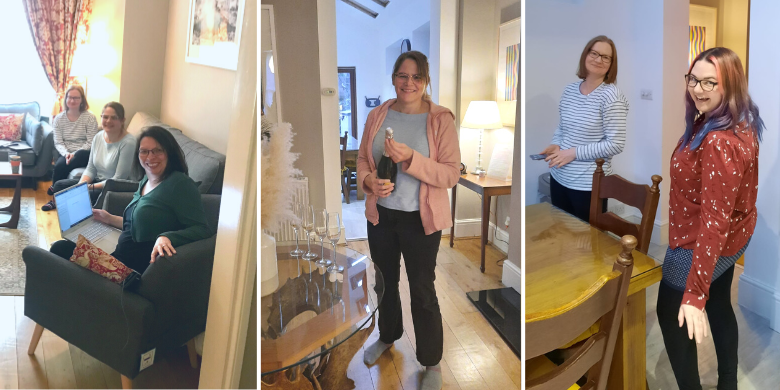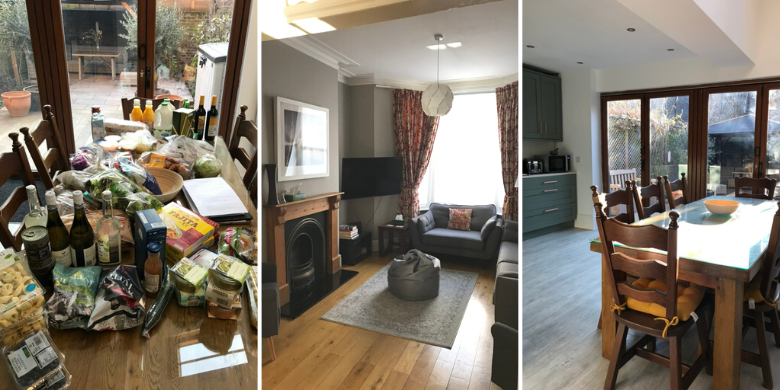I got together with a small group of freelance developmental fiction editors, all of us at about the same point in our careers. We cosied up in a comfortable rented getaway to share ideas and learn from one another.
Hosting a small, informal work retreat for developmental fiction editors has been an idea I’ve wanted to bring to life for years. Whenever I would meet other developmental editors in person (at conferences or professional development days), we’d always have so much to talk about.
Conversation would flow in ways that it just never would online. It felt like we could talk more openly, more intimately. I started picturing an event specific to developmental editors, where we could talk about our work to our heart’s content – preferably somewhere comfortable and cosy, with plenty of tea and pastries.
It seemed I wanted to attend an editing retreat!
And since there weren’t any, I knew I’d have to put one together.
Making it happen
The first thing I needed to decide was whether I was going to make it a paid event (for profit) that I’d sell to anyone who wanted to join, or whether I would run it at-cost and invite-only.
I quickly concluded that no, it shouldn’t be a paid event since I wanted everyone to contribute – I didn’t want to be some kind of tutor. I didn’t want that kind of pressure, but I also wanted the retreat to be about learning from one another – not about me making money or positioning myself on a different level to the others. Also, I had a feeling that covering the costs would be a financial stretch as it was, so I didn’t want to add any more to that.
That made it easier to make it invite-only, too. I wanted to be sure that the editors who came had roughly the same level of experience (so we’d have comparable things to share) and – for my own ease and enjoyment – were people I had met and knew would be lovely to hang out with for a few days!
We ended up with five people in total, and everyone committed with enthusiasm.

I wanted somewhere comfortable and home-like, so a rented properly was ideal. I looked at a few hotels, but the function rooms were often lacking – and I couldn’t imagine being stuck in one for a whole day.
But where in the country? The editors attending were scattered all across the UK. At first, I considered somewhere central, but others quickly reminded me that all train tracks lead to London (in the same way all roads lead to Rome), so we decided on London.
That made it relatively easy to find a suitable Airbnb, since there was so much choice. And luckily, I found the perfect place! It was big and spacious, with double bedrooms for everyone, two bathrooms (one with a bath – something I took advantage of one night), and the décor was stylish and elegant but homely and uncluttered too – though the tangle of deer antlers topped with glass to form a table in the hallway drew comment from the group.
The huge kitchen and dining table meant we were able to cook our own meals easily (keeping costs down) and use both the dining area and the sofa-filled living room (the same sofa I had at home, no less, but with lovely William Morris cushions to add a touch more class) as places to gather and chat.
I proposed a two-night stay. This kept costs down, but meant we had one full day to make the most of each other. Check-in was late afternoon and check-out was late morning, giving people plenty of time to travel.
By the way, if you don’t want to go hungry … put someone with a fear of hunger in charge of the food! (This was me.) We may or may not have ended up with a loaf of bread per person and ten pints of milk …

The main event
After a first meal of way too much pasta, I asked everyone to share what they wanted to get out of the retreat. There were quite a few similar answers, like …
- Get a sense of how others did things
- Talk frankly about pricing
- Reveal any blind spots in our methods or ideas
- Generally just learn from each other
Fiction is such a creative field, and novels vary so much in what they need from a developmental edit. As well as that, developmental editing as a service can be conducted (and priced) in so many ways.
We were all keen to see in more detail what others were doing in order to get a sense of how we were doing. Though it’s perfectly okay for us each to be doing things differently, it’s only natural to want to know how you compare to others in your field.
After long days of travelling, we all turned in fairly early – and I was amused that only two bottles of wine had been consumed! Seems we’re all fairly sensitive types – who would have thought?
After tea and croissants (and eggs and bagels and fruit …) for breakfast, we gathered excitedly for our day of discussion. With my need for structure, I had put together a list of topics in an order I thought would flow well and broke these into two sessions, one for the morning and one for the afternoon. This served as a rough itinerary, making sure we covered everything we wanted to cover, and this worked pretty well!
We had a nice break for lunch, in which I announced I was heading out for a walk. ‘You don’t want company, do you,’ said one editor. It wasn’t a question – my overt introversion was clearly established! Ah, so nice to be around people who understand …

For the second session in the afternoon, I had asked everyone to bring some anonymised examples of projects they’d worked on so we could all get a more accurate sense of how we each worked.
These were all print-outs – no one gave out digital copies to study. The idea was to just get a general sense of working methods and styles. I think this ended up being one of the most useful things we did!
Not only did this satisfy my itch to be nosy, but I found it absolutely fascinating seeing the differences in our styles and approaches. We used our examples to talk more generally about our methods and philosophies, and we asked questions of each other and gained insight into how each of our brains worked.
Interesting outcomes and lessons learned
Just as I’d hoped, everyone was open, respectful and generous with what they shared. There was a general buzz of energy throughout the whole retreat, as we were all just so excited to be able to talk about work that we were passionate about to people who understood!
Here are my personal takeaways:
Pricing is hard – like, really hard
I was slightly surprised when we discovered that almost everyone felt they should be charging more. When we drilled into it, it seemed a lot of us struggled with our mindset around money – fears about pricing ourselves out of work, assumptions about going rates and imagined responses from clients and colleagues alike …
There was too much for us to unpack around money, but it seemed we each had our own mental hurdles.
One such hurdle was not feeling confident in the exchange of value – were our services ‘worth’ the fees we wanted (often needed) to charge? One of the most valuable aspects of the retreat was that it allowed us to praise and reassure each other. I think (hope) this gave some of us a bit more confidence to increase our rates.
We all use tools differently and have different strategies
The differences in how we worked and how we presented our feedback to clients were bigger than I expected!
- Some of us would use book maps to inform our reports but not send these to the client, whereas others would use them to demonstrate structural changes to the client.
- Some of us would dive deep into page edits in the first round to help the author get their manuscript in shape for a lighter second round, whereas others would either do zero or very few page edits in the first round, and others still didn’t leave feedback in the manuscript at all but pulled specific examples into their reports.
- Some would work with manuscripts across multiple drafts (rounds – usually two) and others would do one big, detailed round of editing and then be done.
- Some of us would offer a handful of suggestions we thought would make the biggest impact on the novel, discussing these at great length, whereas others provided reams of specific suggestions, succinctly proposed and explained.
The outcomes were the same: we were helping our clients improve their drafts. But we worked in accordance with our own preferences and the ways our brains worked.
Genre plays a huge role in how we work
We had a couple of romance editors, someone who worked on historical fiction, and then a mix-and-match of sci-fi and fantasy and literary fiction.
I had always thought that genre knowledge would allow editors to provide more specific feedback to their clients, but I hadn’t realised how much the different genre conventions would affect the way editors would approach their developmental edits.
The feedback for a literary novel would be less focussed on plot and structure, whereas plot and structure are huge components of romance fiction, for instance. An editorial report that discussed theory and offered multiple possible solutions would work well for a literary developmental edit, whereas the romance novel often benefitted from lots and lots of very specific structural and story-based suggestions.
The line between developmental editing and coaching can be blurry
I often think about the line on the other end of the service spectrum, between developmental editing and line editing. But with an editor who also provided coaching at the retreat, we had a fascinating discussion about the crossovers and differences between developmental feedback and coaching.
We each had slightly different views on this, but the consensus was that developmental feedback can certainly include a level of teaching (and this would vary depending on the style of the editor and the editor’s perception of what the author would find useful to know). This teaching would also always be focused on the specific issues of the manuscript being developed.
Coaching, on the other hand, often helped authors who were new to writing and had no concept of craft, and the coach would help with mindset and tactics for developing craft, as well as provide accountability and emotional support. Though they might focus on a certain project, what’s learned is often a lot broader.
Everything I’d hoped?
I think we all came away from the retreat feeling more assured and confident – one person even had a whole new service strategy to try!
I have a broader understanding of the different methods and strategies of developmental fiction editing, and this I can bring to my teaching materials and online courses. As well as that, I’ve come away with new ideas to bring to my own developmental edits.
Personally, I had such a wonderful time. I’m so grateful for the comradery, generosity and enthusiasm everyone brought to the retreat. I feel I’ve deepened some friendships as well as formed stronger professional connections. It was everything I hoped for and more, thanks to what everyone brought to the table.
And the couple of nights spent in a fancy townhouse with a never-ending supply of pain au chocolate was pretty nice too.